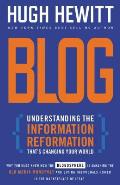 by Hugh Hewitt
by Hugh Hewitt
Combine freedom with low barriers to entry and you’ll be continually amazed at the results.
That’s one of the messages from Hugh Hewitt’sBlog: Understanding theInformation Reformation That’s Changing Your World. Hugh’s been a follower and booster of theblogsphere as an alternative and corrective to the mainstream media for years now. He recognized theincipient media early on, and has been relentless in promoting the best of the individual blogs. Now,he’s turned his attention to the medium as a whole, and how it may be useful outside of mediacriticism and politics.
Hewitt disdains the notion of blogging as a revolution, instead comparing it to the Reformation.Everyone remembers the 95 Theses, the debate they engendered, and the split that followed. But thatdebate wouldn’t have been possible without the printing press, invented 70 years earlier. It was theprinting press that made feasible the broadsides and cartoons (some of which make Ted Rall look like aresponsible, upstanding exemplar of demeanor). Without Gutenberg, Luther’s complaints would haveremained confined to an internal scholastic church debate. With Gutenberg, they set Western Europe onfire. (For those interested in a more in-depth discussion of this history, James “Connections”Burke’s The Day theUniverse Changed has a fine chapter on it.
He compares 2004 not to 1789, but to 1449 and 1517. The blog is the printing press, the mainstreammedia the Church. The blog, like printing, democratizes speech. The MSM, like the Church, is slow torealize that it no longer controls the medium or the message. Also like the Church, it’s notgoing away, but it will have to change.
The most interesting part of the book, the part where Hugh’s clearly playing with ideas, is wherehe tries to detail blogs’ usefulness to companies. The most obvious use is narrowcasting blogads onblogs with highly relevant readership. In this way, blogs closely resemble talk radio, or radio ingeneral. One would be tempted to suggest that Hugh’s radio show made it natural for him to see makethe connection, except that he was one of the only radio hosts even talking about blogs for a longtime.
Hewitt also discusses how companies need to deal with negative PR from a decentralized media crisis.Openness is always advised, but now it’s not enough to post press releases on the website, or call apress conference with the local newspapers and tv crews. Companies need to identify which blogs peopleread, and which blogs the bloggers read, and make sure they have access, too.
It’s in the area of content that the book gets more intriguing. How to take advantage of all thatdistributed knowledge about the company and its industry? He suggests leadership blogs, managerialblogs, or employee blogs, each with its own risks and rewards. If the company’s large enough, thesecould be of value even if limited to the company’s intranet. External blogs have potential, too.Hugh suggests hiring talented writers to blog for the company, but blogging interest comes fromknowledge and insight, something an industry professional is more likely to have.
The story of the rise of blogs, from the Trent Lott takedown to Rathergate, is probably familiar toanyone reading these words. In a section clearly aimed at newbies, but good review for us all, Hewittgoes over that history, and explains how the MSM got itself into this fix.
Blog has a conversational, almost Blognerian, style. Occasionally he lapses into Blogosphericself-referentiality (“As Lileks would say…”). For those just discovering blogs, the book is litteredwith good blogs and their URLs, in bold, although Hugh did manage tooverlook anumber ofexcellent localpublications.
If you haven’t heard of blogs, this is as good a place as any to start. If you have, it’ll decodesome of the secrets of successful blogging, and perhaps get you thinking about some new ways to makeuse of the medium.